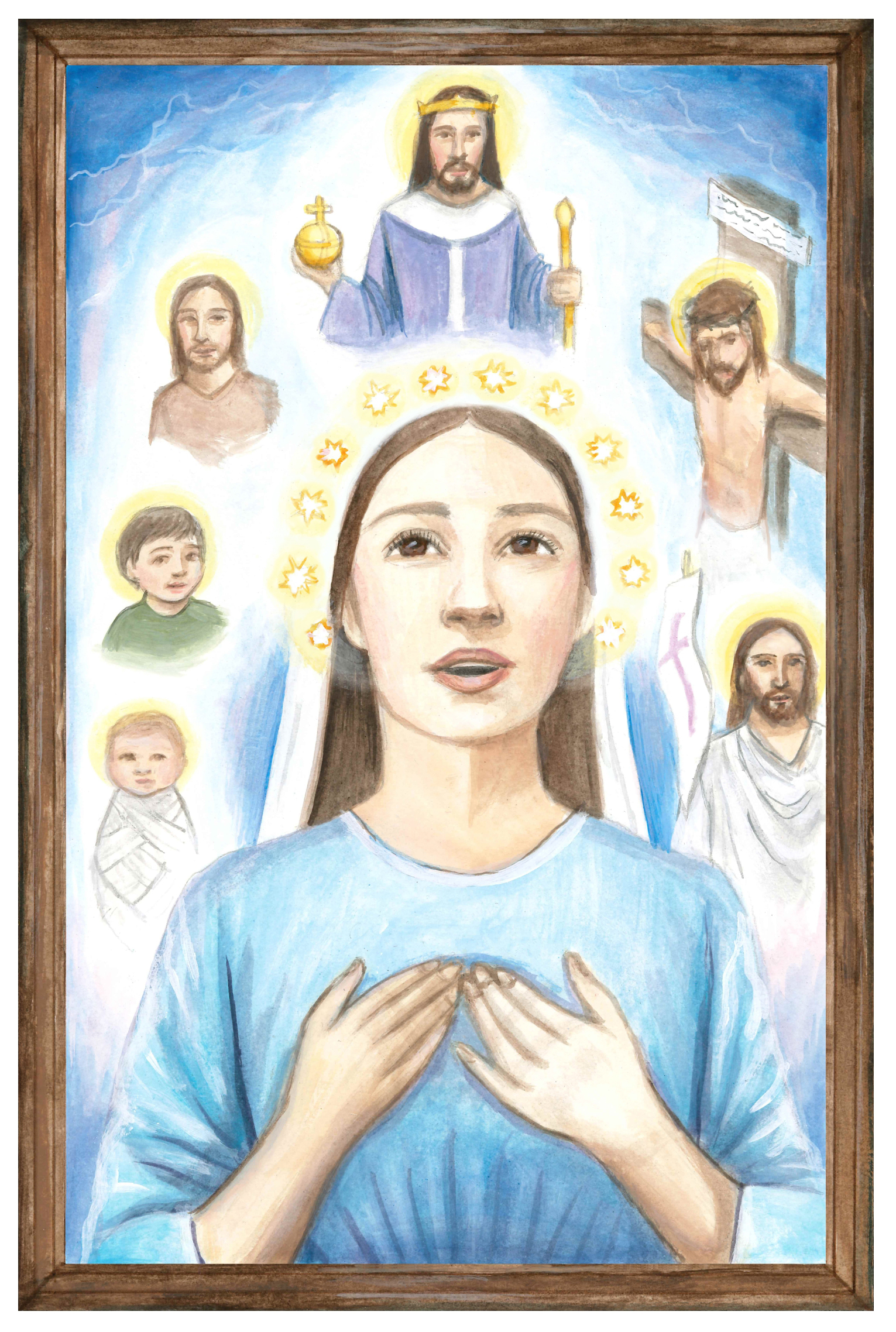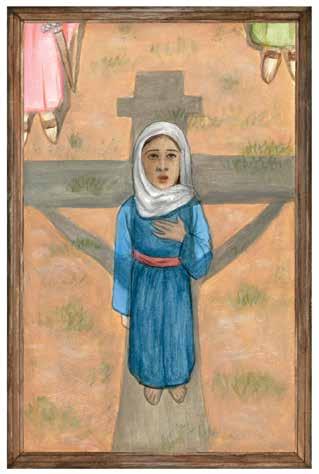
7 minute read
The Vocation of Christian Motherhood
by Kelly Klages
Over the first half of 2025, I worked on the illustrations for a book project with Rev. Will Weedon. He had written a devotional meditation on the life and remembrances of Mary, the mother of Jesus. This book, I Remember, was created for both children and adults to ponder and enjoy. It was a wonderful challenge to translate these familiar moments and scenes into a visual tapestry of the experiences of the most unique mother in history. Quite a lot of what I was reading, remembering, and illustrating hit differently now that I’ve been a mother for 18 years. Asked to write on the Christian vocation of motherhood, it made sense to me to do so with a view to the contemplations that came from working on this project.
I hesitated at first. After all, what Mary experienced as a mother was so unique; could we really learn about motherhood from someone who raised the incarnate God-Man? Is anything there really relatable? Our kids aren’t perfect, and you and I are hardly famously revered paragons of motherhood.

Since the days of the Fall, motherhood has come with a heavy burden. We know that it’s a gift of God, a blessed and awesome reality. It’s also a hard job, a steep responsibility. In a digital world, a million people opine on how you’re supposed to be doing this job, and the many catastrophes that will ensue if you make a mistake. And opinions change every few years, so even if the things you’re doing are deemed correct now, they’ll inevitably be proven to have been wrong momentarily. We hear urges to “cancel” parents who aren’t on the same page as their offspring, not for being abusive but for being human—sometimes, indeed, for being Christian. I’m convinced that this is one of several reasons why motherhood itself is being abandoned as a vocation by so many young women. Who wants to be judged by the kind of criteria that mothers are judged by today? Drowning in noise and data posing as wisdom, many young people are despairing of ever being good enough to not ruin the lives of the next generation, deciding that opting out altogether is easier.

But such despair is not humility. Humility is not opting out of life. Humility is realizing that you’re not God, that it’s not up to you to control all the outcomes. It’s not even up to you to be able to see with perfect clarity in the present moment. God’s power is made perfect in our weakness. Humility is a fruit of faith.
And with this realization, we are brought back to a young Galilean woman who was given good news about the salvation of God’s people... by means of a child she would miraculously bear. Surely it was a task too great for her; she was not strong enough, not expert enough, not qualified enough—or so she certainly must have felt. In her circumstances, Mary cannot have been very sure about most of what we demand today for our conception of a successful child-rearing future: money, educational opportunities, ideal neighbourhoods, family support, and so on. Mary is the absolute epitome of “You had assumptions of what motherhood would be like? Surprise!”
Looking through Mary’s eyes as the Gospels share her part in the great story, we become aware of so many sight-unseen moments. Some situations may be more familiar to us than first imagined. A baby coming that we didn’t expect or plan for. The likelihood of “people talking.” People dropping hints about scary-sounding things coming in the future that we don’t really understand (Simeon). Feeling the gradual sense of separation as a grown child pursues his own paths and purposes. Concern for your child’s mental health or inexplicable behavior. Perhaps, wondering if a marriage may or may not be down the road. Watching people treat that child cruelly and unfairly. Losing a child over a period of time and panicking. Actually losing a child to an unthinkable death.
Throughout all this narrative, Mary’s reactions are moving, deeply human, and fueled by faith from the beginning. Sometimes, her faith looks extraordinary. To the angel, she says: “Behold, I am the servant of the Lord; let it be to me according to your word” (Luke 1:38). Elizabeth praises Mary for her faith: “Blessed is she who believed that there would be a fulfillment of what was spoken to her from the Lord” (1:45). Mary’s trust in Jesus’ ability to help the wedded couple of Cana comes even before the disciples put their faith in Him, her participation reminiscent of the Canaanite woman who expects crumbs from the (seemingly) unwilling Master’s table. She is the only person present both when Jesus breathes His first and when He breathes His last.

Yet, of course, she isn’t perfect. She gets things wrong, and responds according to that imperfect understanding. She worries. Her timing is off. She reprimands God incarnate for being inconsiderate of her. Yet, she isn’t cancelled and doesn’t have her mom card revoked for her mistakes, sins, or narrowness of view. She is treated with patience and love, just like the other floundering disciples. “But Mary treasured up all these things, pondering them in her heart” (Luke 2:19). This isn’t just sentiment, but that earnest striving for understanding, wisdom, and remembrance which mothers everywhere will relate to. She’s trying—and often failing—but always under the banner of God’s love and mercy. If this can be true of the mother of our Lord Himself, we know that He will extend grace to us, too.
Mothers need to hear the Law and the Gospel just like every Christian does. When we feel complacent, or inclined to ditch our calling to provide and nurture in favour of selfish ambition, we need to hear the Law which calls us to repentance. When we are grieved by how we fall short in our service, the Gospel can do its forgiving and comforting work in our lives. Empowered thus by God’s Word, we share this work of God with our own children. Like us, the daily walk of repentance and faith in Christ, through His forgiving sacrifice on the cross and resurrection from the dead, is the one thing they need above all else.
We see, not only in Mary’s life but in our own, that it’s often actually better for ourselves and others if we do not know the whole story. “Faith” isn’t a cruel game that God plays to keep us from knowing and having what we need—that is Satan’s lie to Eve. When we walk by faith, we do so believing that God’s Word is the illumination required, even when everything else is dark and unclear.
Motherhood throws more curveballs than just about any other vocation imaginable. We must be content to let God do His job instead of trying to take over. Mothers and fathers serve as “masks of God” for the benefit of the children we are given to love, but we are not called to be saviours or deities—nor are our children to be idols that lead us away from God’s Word and will. We are called to love and serve in accordance with God’s own commandments, and receive forgiveness for our sins and inadequacies. God calls normal, ordinary sinners to follow Him and to serve our neighbour—even to participate in His miracle of bringing new life into the world. Humility calls us, like Mary, to pursue wisdom, faith, and understanding while being content to be human.




